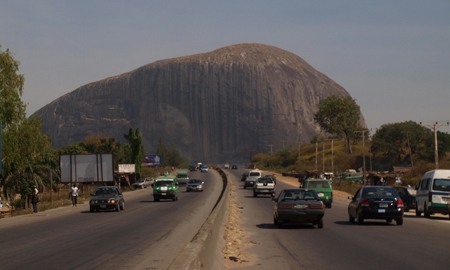Decades ago, newly minted nations were eager to shake off their colonial pasts and set out to establish their own identities.
Several decided that an excellent way to do this was to create brand new capital cities, carefully planned to not only reflect the country’s own, indigenous character but also to show the world they were modern, striving entities eager to embrace the future.
In Nigeria, the leaders chose to build their utopian capital in the neutral centre of the vast country, straddling the north-south divide, in the newly designated Federal Capital Territory.
Named Abuja after a former Hausa king, the city was to replace the overcrowded, chaotic and muggy port of Lagos on the Atlantic coast, bequeathed by the former British colonial administration as the capital.
Three US companies were hired to carefully plan and develop the new metropolis set it in an area several times larger than the old capital and cobbled together on land from neighbouring states.
The prestigious Japanese architectural firm of Kenzo Tange, hailed for his groundbreaking modernist structures around the world from Tokyo to Chicago, was charged with designing the city’s central neighbourhoods.
The wide boulevards, spacious intersections, tree-studded central medians and pleasant parks plotted by these designers gave Abuja a neat and attractive appearance familiar to any Western city dweller.
Officially inaugurated in 1991, Abuja is now considered the best of Africa’s planned cities. It has an estimated population of 2.3 million inhabitants and, because of Nigeria’s growing importance in the world, is recognised as a “must-visit” capital for world leaders.
As well as hosting Nigeria’s ministries, state representative offices, foreign embassies and myriad government bureaux, Abuja is also the home to the headquarters of the Economic Community of West African States (ECOWAS) and the regional offices of OPEC.
Diplomacy, power politics and economics aside, the city has other attributes that make it a favourite for leisure travellers visiting Nigeria and for the resident expatriate community.
Dominating the capital are two stunning natural phenomena: Aso Rock and Zuma Rock, two massive stone outcrops. The former – at 400 metres high – is a popular spot for weekend runners. It provides an impressive backdrop to the capital city’s Three Arms Zone – so called because it is home to major institutions: the Presidential Complex, the National Assembly and the Supreme Court.
Meanwhile Zuma Rock – at 725 metres – is one of Africa’s most distinctive landmarks and depicted on the Nigerian 100-naira banknote. It is regarded as the ‘Gateway to Abuja' and marks an entry point to the Federal Capital Territory, which begins at its base where the neighbouring Niger State ends. The rock is also reportedly the exact geographical centrepoint of the country.
There are manmade wonders, too. The Nigerian National Mosque, with its four magnificent Ottoman-style minarets reaching into the African sky, is topped with a shimmering golden dome.
As a reflection of the country’s main religious demographics, just across the street from the mosque is the interdenominational Nigerian National Christian Centre, or National Church of Nigeria, dedicated in 2005 on the country’s 45th anniversary of independence.
Secular monuments include the still-to-be-completed Nigeria National Complex that is to boast a 120,000-square-metre cultural centre showcasing the country’s rich artistic and cultural heritage, and the 170-metre-high Millennium Tower.
Both were designed by noted Italian architect Manfredi Nicoletti, who also was responsible for the impressive Millennium Park, the city’s largest green area, opened officially by Queen Elizabeth II in 2003.
Visitors and residents alike also delight in the Presidential Complex, the National Stadium, the Central Bank of Nigeria headquarters and the National Defence Headquarters, or Ship House, which, as its name implies, is shaped like a massive sea-going vessel.
While the city is constantly evolving with ongoing construction projects and expansion causing traffic snarls and other urban headaches, Abuja is clearly set on remaining one of Africa’s stellar cities and the capital of a proud nation that is rapidly becoming a global political and economic power.

0 COMMENTS